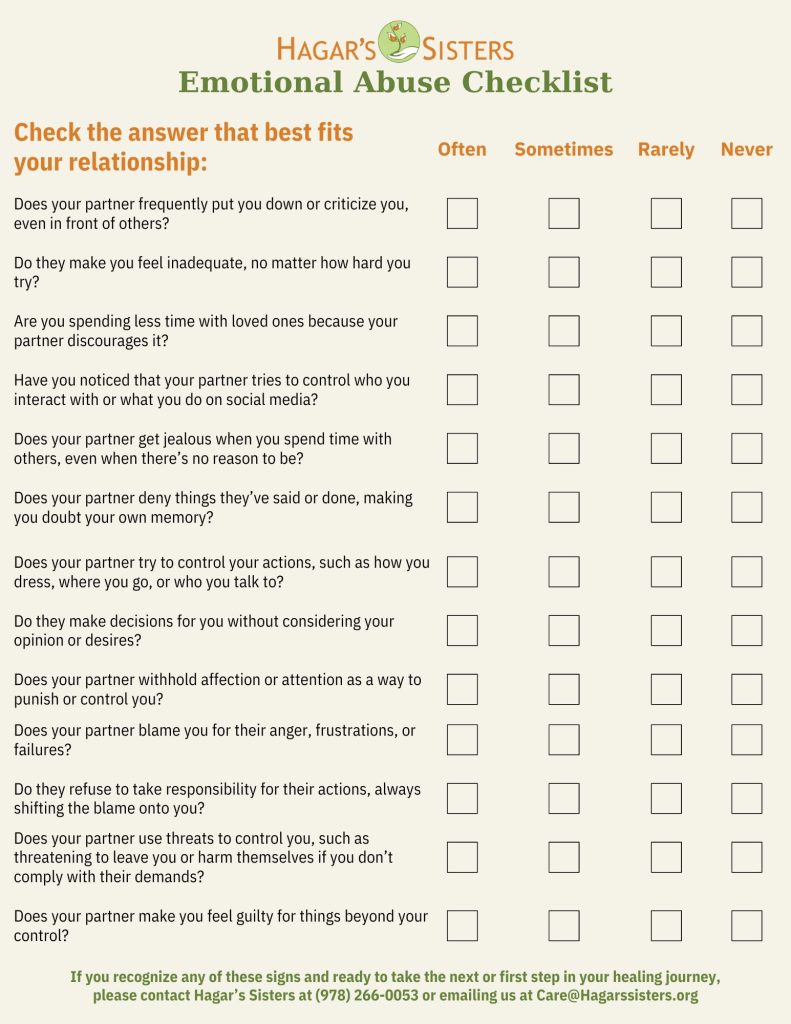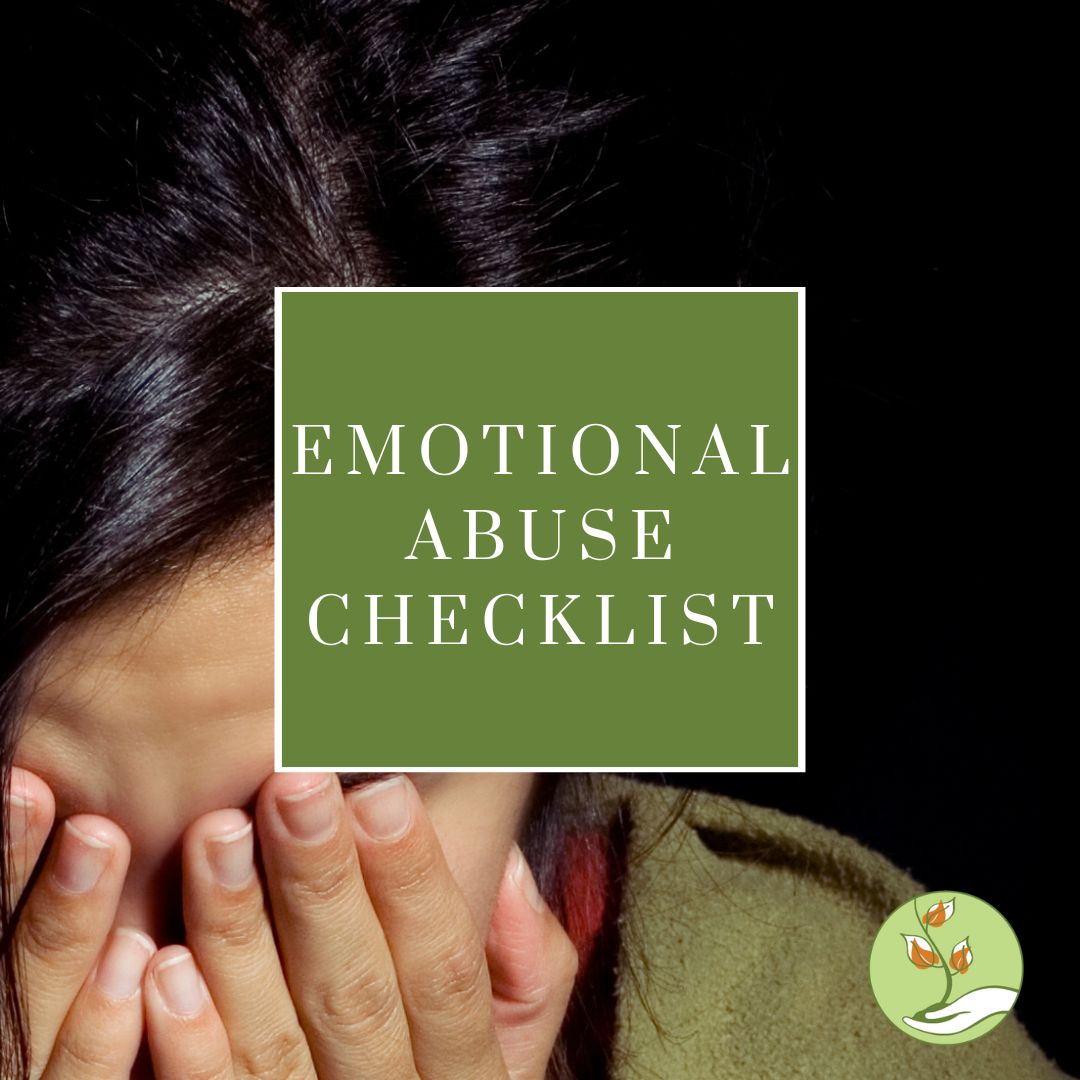Emotional Abuse Checklist: Recognize the Signs and Take Action
Emotional abuse in a relationship can be subtle yet profoundly damaging. Unlike physical violence, emotional abuse leaves no visible scars but can cause deep psychological harm. It is one of the many tactics that abusers employ to keep power and control over their victims (explore The Power & Control Wheel for to learn about others). Understanding the red flags of emotional abuse is crucial for maintaining your mental health and ensuring you’re in a healthy relationship. Below is an emotional abuse checklist to help you identify emotionally abusive behaviors and take necessary steps to protect yourself. You can also view our downloadable checklist HERE.
ATTENTION: If you are a Christian currently experiencing domestic abuse and are torn between your commitment to God and your safety, WE CAN HELP. Please explore our website and contact us when ready. We are here for you. Back to the article.
What Is Emotional Abuse?
Emotional abuse involves manipulative, controlling, and degrading behaviors that harm a person’s emotional well-being. It’s not just about the words spoken but also the actions and attitudes that can make someone feel worthless, powerless, and trapped. Emotional abuse in a relationship often escalates over time, making it harder for victims to recognize and address the issue.
Unlike physical violence, which leaves visible signs like bruises and scars, emotional abuse is often invisible, which can make it harder to recognize. This form of abuse can erode a person’s self-esteem and mental health, leaving lasting emotional scars. Emotional abuse can occur in any type of relationship—romantic, familial, or even professional. It’s important to note that emotional abuse is about power and control. The abuser uses emotional manipulation to dominate and control their partner, creating an environment of fear and dependency.
Why It’s Important to Recognize Emotional Abuse
Experiencing emotional abuse can have long-term effects on your mental health, leading to anxiety, depression, and a diminished sense of self-worth. Identifying signs of emotional abuse early can help you avoid further harm and enable you to take steps toward a healthier relationship or escape a toxic one.
Emotional abuse can also lead to physical harm. In some cases, emotional abuse precedes physical violence as the abuser gradually escalates their behavior. This makes it even more critical to recognize emotional abuse before it worsens. The sooner you identify the signs, the sooner you can take action to protect yourself. The emotional toll of abuse can be devastating, leading to feelings of isolation, hopelessness, and helplessness. This is why it’s essential to be aware of the warning signs and take them seriously.
Emotional Abuse Checklist: Red Flags to Watch Out For
Here’s a checklist to help you identify whether you might be experiencing emotional abuse in your relationship. If several of these signs resonate with you, it may be time to evaluate your relationship and consider safety planning.
1.Constant Criticism and Belittling
- Does your partner frequently put you down or criticize you, even in front of others?
- Do they make you feel inadequate, no matter how hard you try?
Constant criticism is a hallmark of emotional abuse. An emotionally abusive partner often uses criticism to undermine your confidence and self-esteem. This criticism can be about anything, from your appearance to your abilities, and is usually delivered in a way that is demeaning and hurtful.
2. Isolation from Family and Friends
- Are you spending less time with loved ones because your partner discourages it?
- Have you noticed that your partner tries to control who you interact with or what you do on social media?
Isolation is another common tactic used by emotionally abusive partners. By cutting you off from your support network, the abuser can maintain control over you. They may use guilt, jealousy, or even subtle manipulation to keep you away from your friends and family. Social media can also be a tool of control, with the abuser monitoring your interactions and restricting who you can communicate with online.
3. Unpredictable Mood Swings
- Does your partner’s mood change dramatically without warning?
- Do they go from affectionate to angry or cold without any clear reason?
Unpredictable mood swings can leave you walking on eggshells, never knowing what might trigger your partner’s anger or withdrawal. This emotional volatility can make you feel like you’re constantly on edge, trying to avoid upsetting your partner.
4. Gaslighting and Manipulation
- Does your partner deny things they’ve said or done, making you doubt your own memory?
- Do they twist situations to make you feel like you’re the one at fault?
Gaslighting is a particularly insidious form of emotional abuse where the abuser makes you question your own reality. Over time, this can erode your confidence in your perceptions and memories, making you more dependent on the abuser’s version of events. This manipulation can lead to significant mental health issues, including anxiety and depression.
5. Excessive Jealousy and Possessiveness
- Does your partner get jealous when you spend time with others, even when there’s no reason to be?
- Do they accuse you of infidelity or demand constant reassurance of your loyalty?
Excessive jealousy and possessiveness are often signs of deep-seated insecurity in the abuser, which they project onto you. This behavior is not a sign of love, but of control. The abuser may try to limit your interactions with others and make unreasonable demands on your time and attention.
6. Controlling Behavior
- Does your partner try to control your actions, such as how you dress, where you go, or who you talk to?
- Do they make decisions for you without considering your opinion or desires?
Controlling behavior can take many forms, from making decisions for you to dictating your daily activities. The abuser may use subtle manipulation or overt demands to control your behavior, making you feel like you have no autonomy in the relationship. This can extend to financial control, where the abuser restricts your access to money or resources, further limiting your independence.
7. Emotional Withholding
- Does your partner withhold affection or attention as a way to punish or control you?
- Do they give you the silent treatment when they’re upset with you?
Emotional withholding is a passive-aggressive form of abuse where the abuser uses affection or attention as a weapon. By withholding these, the abuser can punish you or control your behavior. The silent treatment is a common tactic, where the abuser refuses to communicate until you conform to their demands.
8. Blaming You for Their Problems
- Does your partner blame you for their anger, frustrations, or failures?
- Do they refuse to take responsibility for their actions, always shifting the blame onto you?
Blame-shifting is a common tactic in emotionally abusive relationships. The abuser refuses to take responsibility for their actions and instead blames you for their problems. This can make you feel guilty and responsible for things beyond your control, further eroding your self-esteem.
9. Threats and Intimidation
- Does your partner use threats to control you, such as threatening to leave you or harm themselves if you don’t comply with their demands?
- Do they make you feel unsafe or scared to voice your thoughts?
Threats and intimidation are overt forms of emotional abuse that can create a climate of fear in the relationship. The abuser may use these tactics to control your behavior and keep you in a state of constant anxiety. This can also include threats of physical violence, which are serious red flags that should not be ignored.
10. Guilt-Tripping
- Does your partner make you feel guilty for things beyond your control?
- Do they use guilt to manipulate you into doing things you don’t want to do?
Guilt-tripping is a manipulative tactic where the abuser makes you feel responsible for their emotions or actions. This can be a powerful tool of control, as it plays on your sense of empathy and compassion. The abuser may use guilt to manipulate you into doing things you’re uncomfortable with or to prevent you from asserting your own needs.
ATTENTION: If you are a Christian currently experiencing domestic abuse and are torn between your commitment to God and your safety, WE CAN HELP. Please explore our website and contact us when ready. We are here for you. Back to the article.
The Impact of Emotional Abuse
Emotional abuse is a form of domestic violence that can have severe consequences on your mental health and overall well-being. Victims of emotional abuse often experience low self-esteem, anxiety, depression, and a sense of worthlessness. Over time, these effects can lead to more serious mental health issues, including suicidal thoughts.
The emotional toll of abuse can also affect your physical health. Stress and anxiety caused by emotional abuse can lead to physical symptoms such as headaches, stomach problems, and sleep disturbances. In some cases, emotional abuse can escalate to physical violence, making it even more critical to recognize and address the issue early.
Safety Planning and Taking Action
If you recognize any of these signs from the emotional abuse checklist in your relationship, it’s essential to develop a safety plan. This might include confiding in a trusted friend or family member, seeking professional counseling, or contacting Hagar’s Sisters. Please feel free to further explore our website, find out more about our services, and when ready, reach out to a compassionate care coordinator. We are here for you.


